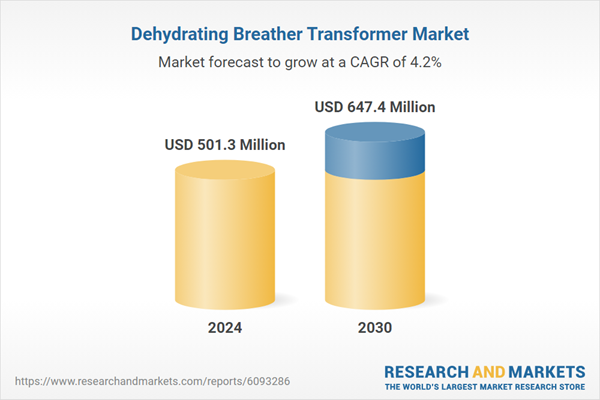Speak directly to the analyst to clarify any post sales queries you may have.
10% Free customizationThis report comes with 10% free customization, enabling you to add data that meets your specific business needs.
Key Market Drivers
Increasing Demand for Transformer Reliability and Longevity
A critical factor propelling the dehydrating breather transformer market is the growing emphasis on maximizing transformer reliability and extending service life. Transformers are foundational to electrical grids, and their performance is vulnerable to moisture, which compromises insulation and transformer oil. Dehydrating breathers mitigate this risk by filtering moisture from the air entering the transformer, thus preserving oil quality and preventing internal degradation.This role is vital in high-humidity or extreme environments, where moisture-related faults are more frequent. Rising awareness among utilities and industrial users regarding the economic impact of unplanned outages is leading to increased adoption of these devices. Furthermore, aging transformer fleets in developed countries are being upgraded with modern breathers as a cost-effective reliability measure. With the added complexity of modern, interconnected power grids, ensuring transformer stability is paramount, supporting sustained demand for effective moisture management systems.
Key Market Challenges
High Initial Costs and Investment Constraints
A notable challenge in the market is the relatively high upfront cost of acquiring and installing advanced dehydrating breathers, especially those with smart or IoT capabilities. These high-performance devices often use specialized materials and technology, increasing capital requirements. For organizations in cost-sensitive markets, prioritizing such investments can be difficult amidst broader infrastructure or equipment needs. Additionally, integration with existing systems may require technical modifications, increasing installation complexity and overall cost. The need for skilled personnel and periodic desiccant replacement also contributes to long-term ownership expenses. These factors can limit adoption, particularly among small-scale utilities or in developing regions.Key Market Trends
Integration of Smart Technologies and IoT-Enabled Dehydrating Breathers
The incorporation of smart technologies into dehydrating breathers is transforming the market landscape. Traditionally passive, these devices are now evolving into active components of transformer health management. Equipped with sensors, modern breathers can monitor moisture levels, desiccant saturation, and temperature, transmitting real-time data to centralized systems. This enables predictive maintenance strategies that reduce downtime and maintenance costs. The trend aligns with broader smart grid and digital utility initiatives, making IoT-enabled breathers an attractive option for utilities looking to modernize their asset monitoring infrastructure. These advancements enhance transformer protection while contributing to more efficient and responsive grid operations.Key Market Players
- ABB Ltd.
- AGM Container Controls Inc.
- Des-Case Corporation
- Qualitrol Corporation
- Maschinenfabrik Reinhausen GmbH
- Hubbell Incorporated
- Eaton Corporation
- HYDAC International GmbH
Report Scope:
In this report, the Global Dehydrating Breather Transformer Market has been segmented into the following categories, in addition to the industry trends which have also been detailed below:Dehydrating Breather Transformer Market, By Type:
- Conventional
- Self-Dehydrating Breather
Dehydrating Breather Transformer Market, By Application:
- Utility
- Industrial
- Others
Dehydrating Breather Transformer Market, By Region:
- North America
- United States
- Canada
- Mexico
- Europe
- Germany
- France
- United Kingdom
- Italy
- Spain
- Asia Pacific
- China
- India
- Japan
- South Korea
- Australia
- South America
- Brazil
- Colombia
- Argentina
- Middle East & Africa
- Saudi Arabia
- UAE
- South Africa
Competitive Landscape
Company Profiles: Detailed analysis of the major companies present in the Global Dehydrating Breather Transformer Market.Available Customizations:
With the given market data, the publisher offers customizations according to a company's specific needs. The following customization options are available for the report.Company Information
- Detailed analysis and profiling of additional market players (up to five).
This product will be delivered within 1-3 business days.
Table of Contents
Companies Mentioned
- ABB Ltd.
- AGM Container Controls Inc.
- Des-Case Corporation
- Qualitrol Corporation
- Maschinenfabrik Reinhausen GmbH
- Hubbell Incorporated
- Eaton Corporation
- HYDAC International GmbH
Table Information
| Report Attribute | Details |
|---|---|
| No. of Pages | 188 |
| Published | June 2025 |
| Forecast Period | 2024 - 2030 |
| Estimated Market Value ( USD | $ 501.3 Million |
| Forecasted Market Value ( USD | $ 647.4 Million |
| Compound Annual Growth Rate | 4.2% |
| Regions Covered | Global |
| No. of Companies Mentioned | 8 |









